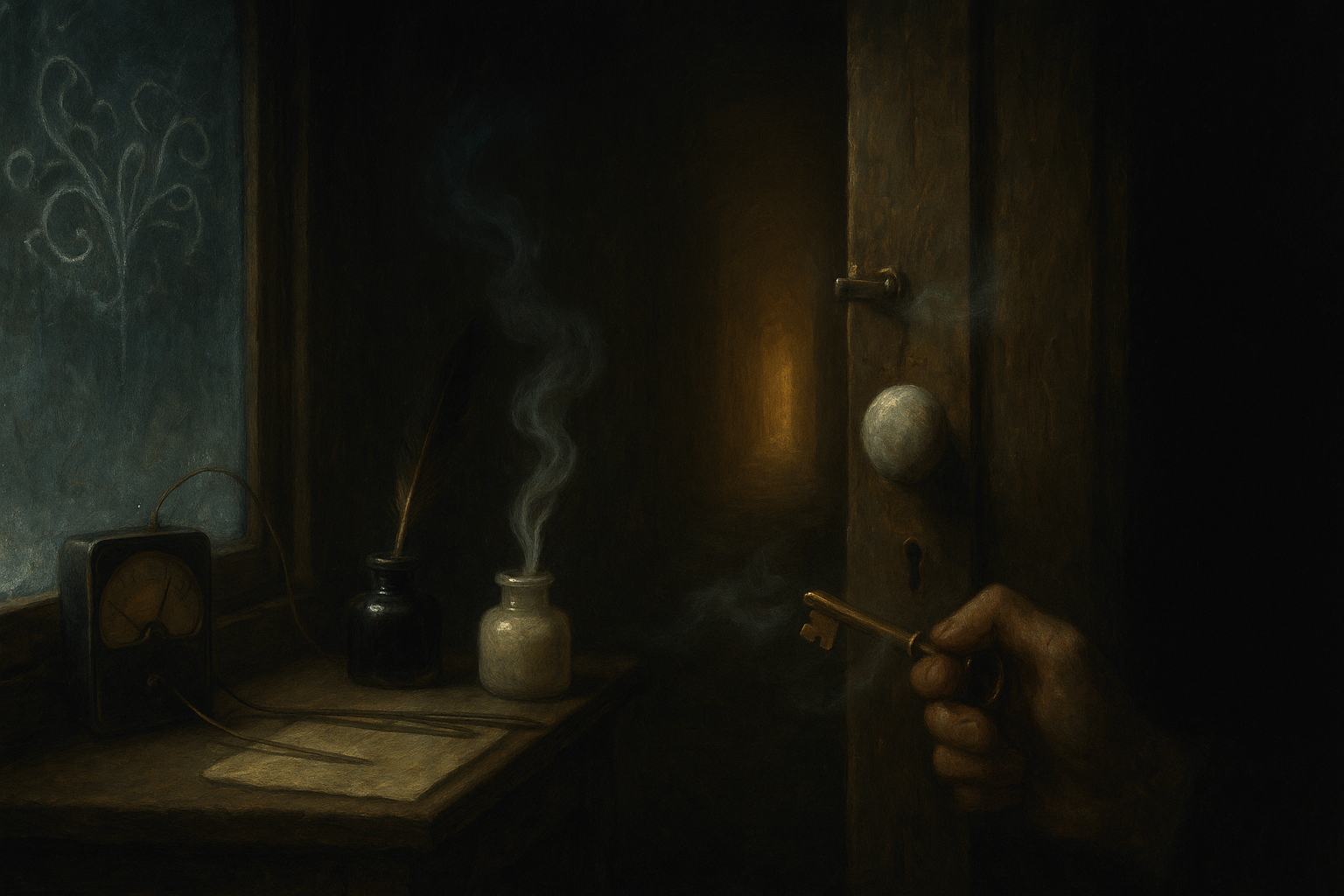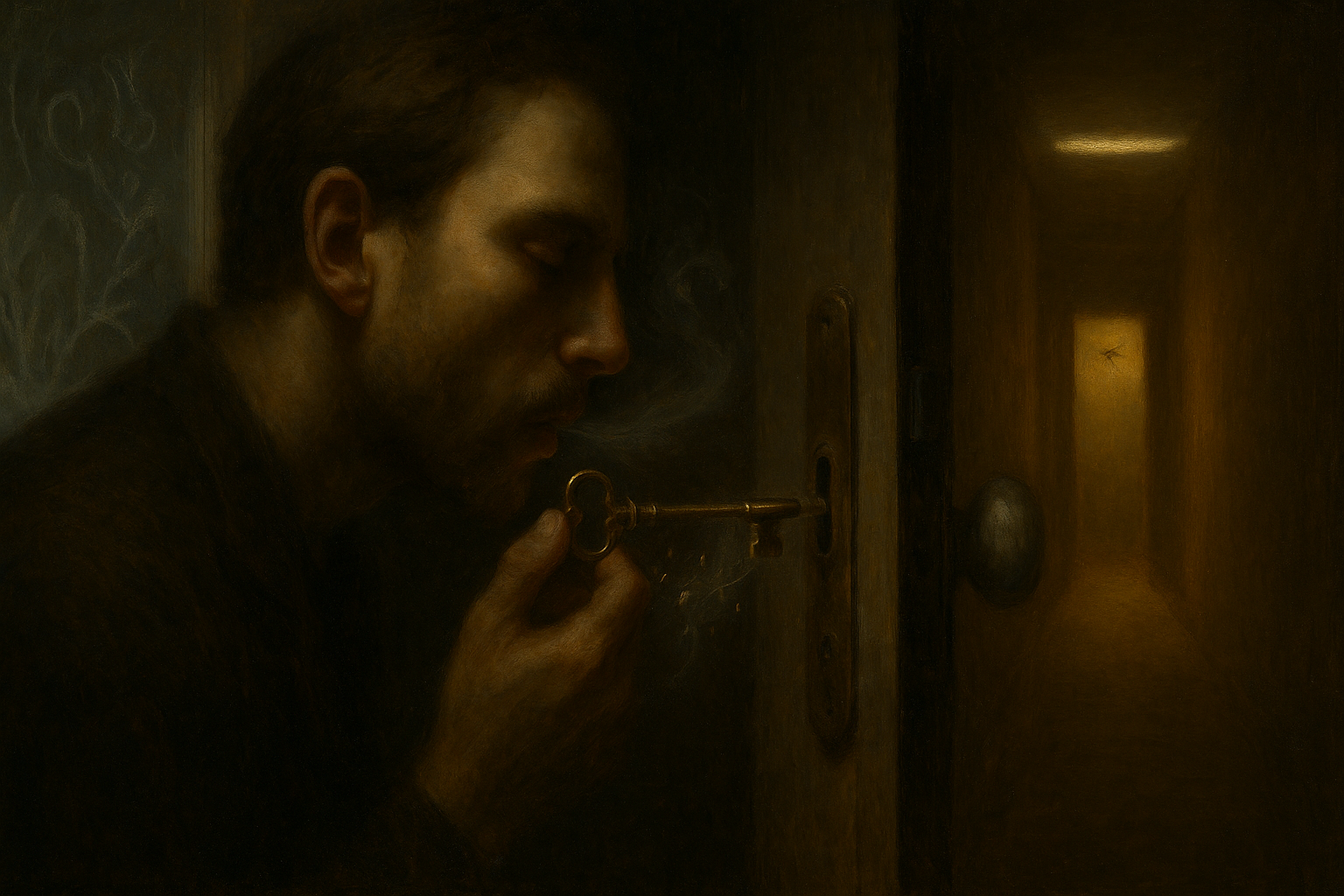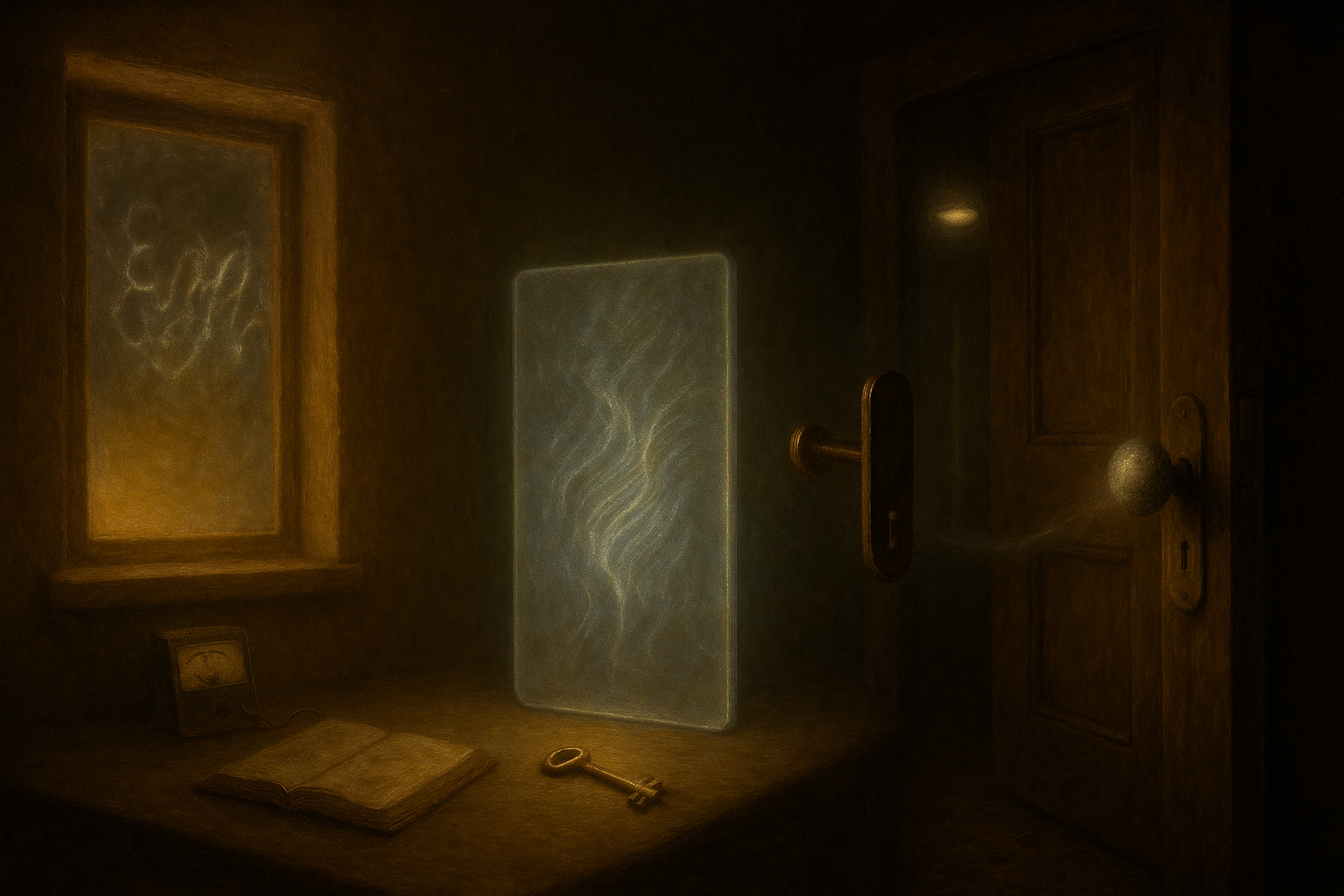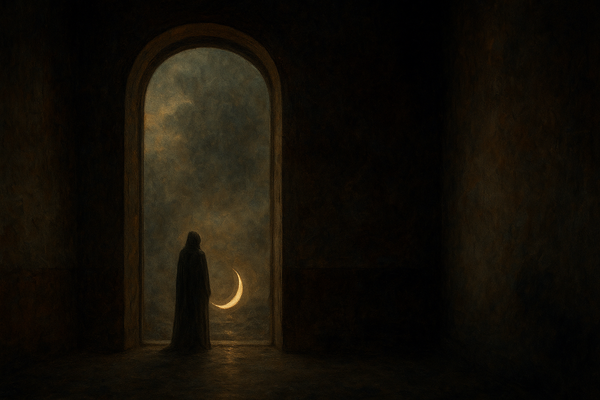KEYS, LATCHES, TURNS

Under utility light gone sacral, a whitened doorknob blooms with rime. The lock wants more than a key; pressure gathers, and the crossing crosses back. Down that hush-lit corridor, the pane keeps writing what you cannot — an afterglow you carry home.
I. Threshold Mechanics
First frost writes thin Enochian across the cheap window, its letters a saccade of light-bites that you read the way a wound reads a blade: not for meaning, but for memory; your breath incense-smokes the hall, each exhale a ghost-priest, and the cold brass key — fugitive comet, pocket reliquary, instrument of etiquette and rupture — presses a lunar ache into your palm while, somewhere past the grammar of drywall, a latch unlips and a door unclicks with the precise, obscene sweetness of a mouth learning your name for the first time again, and because you are neither brave nor careful but simply tired of living under the tyranny of coherent days, you follow the unclick into the corridor that always waits for you when you remember it exists, and you find it as before: utility light gone sacral, fluorescent stutter smoothed into a chasuble glow, plaster with the sweet, stale breath of old vellum, and a whitened doorknob blooming with rime as if winter had a gland and the gland chose this single object as its nipple, and you think this is ridiculous, you think this is precise, you think this is impossible but of course, and with the feral etiquette of the initiated who always arrive late to their own rite, you bring the key to your mouth and taste the dull bright of brass — clinic and chapel coiled in a single ion — then lower it, then raise it, then lower it again, rehearsing inevitability, because you learned young that repetition is how you teach the body to trust the future.
Keys, latches, turns. The words are mechanical rosary, procedural spell, a secular liturgy with a screw’s humility, and you run them in your head like knuckles over old scars; you count them because the counting holds the dark where it cannot harm you and paints the dark where it cannot lie; you count them because counting is faith minus superstition, and you have tried faith with superstition and faith without superstition and the door answered neither until you stopped asking it to pretend to be something other than pressure and pivot.
You pause. You put your ear to the wood. It has a temperature you do not. You hear a heart that is not yours learning your rhythm the way a thief learns the house he will rob: by living in it, briefly, with the lights off, and you know — because you have always known and because comprehension is a loop that tightens with each pass — that the hinge is not a part of the door but a punctuation in your spine; that the corridor is not a place but a pressure gradient inside attention; that angelglass is not glass but the lucid boundary where language loses its fear of matter and begins to instruct it; and though your lips are chapped and your memory is a traffic accident you keep revisiting for comfort, you lift your hand and the hand lifts you, you turn to the turn, and the turn turns you, and the door opens the way a throat opens to truth and closes to everything else.
There is an odor like wet paper and cloves; there is a sound like prayer under a respirator; there is a dance your shoulder performs that your shoulder refuses to remember later; there is the frost-text still studying you from the pane you left, which is the pane you carry forward, because movement is a kind of copying that keeps the original intact; there is the key going warmer in your fist; there is the syllabic flinch of your given name as it anticipates the work it has been doing for you and against you and around you; there is the precision of nerves, the equity of dread, the politics of desire; there is the thought you will keep pretending not to have: if I cross this time the crossing will cross me back. You smile like a cut learning to be a mouth. You enter.

II. Lab-Reliquary
We inventorize the corridor as if it were a specimen and we were both scientists and mourners; we call the light an instrument and the shadow an annotation; we measure the whitened doorknob’s rime with our tongues because calibration must sometimes be carnal to be accurate; we catalog plaster breath — vellum, vellum — and add it to the archive of feels-like: feels like a manuscript left beside a radiator; feels like a psalter kept under a sink; feels like the field notes of an angel studying humidity; and because our epistemology was broken by beauty long before it was dignified by method, we allow both outcomes to stand: data and devotion, cross-pollinating like plants that never asked for bees and got algorithms instead.
Keys, latches, turns: the procedural tricolon by which we keep the vision honest, the way a metronome keeps a heart from pretending it is a drum. Keys: we quantify their metals, trace the oils that make them legible to the lock and yours to yourself, plot their wear like a time-lapse of a city learning to vote. Latches: we listen to their speech, marvel at the dialects of click — nasal, sibilant, velar — each a microtheology of consent. Turns: we chart torque and tremor, the little seisms your wrist performs when shame and hunger argue about sovereignty.
We write in two inks: one acidic and exact, leaving lines like scalpel-syntax; one milk-warm and fugitive, a mothering script that vanishes unless you read it aloud. We read aloud, of course; we are not atheists here, only atheists of the boring gods. We take voltmeter readings from the angelglass threshold where Enochian frost meets domestic apparition; the numbers jitter, then settle, then jitter again, and we record the jitter because the jitter is information the way tears are, which is to say: neither necessary nor false, excessive and true.
We are an assembly — not of bodies but of voices that once lived in bodies and voices that hope to: the archivist who alphabetizes dreams because no institution will let her catalog miracles; the paramedic who hums under his breath because he has touched the hinge and knows mouths can be doors both ways; the child who survived by making lists and now survives by unmaking them; the lover who counted bruises like moons and vowed to become a tide; the elder who refuses to call the lock a metaphor because she has felt it drag her across the thin ice of her own name. We are a chorus, and though chorus implies harmony we carry dissonances like little censers, swinging them, letting smoke falsify the linearity of the hallway until the hallway admits it is a throat, until the throat admits it is a horn, until the horn admits it is a tunnel for light learning the old trick of behaving like matter when watched.
We confess to one another and to the corridor that the scientific method is a prayer with consent forms; that the ceremonial magick we practice is just hypothesis with theater, except hypothesis never made us shake this hard; that the words we refuse — miracle, angel, soul — are only words we placed in quarantine until we learned the PPE of having them. We confess that the whitened doorknob tastes like iron and exes; that our tongues are notebooks; that every inventory is a love letter learning to live without adjectives and failing beautifully.
We accept that our plural throat sometimes becomes your singular name, and when it does our tongue stutters over its consonants — how they keep secrets by pretending to be stops — while our vowels run salt and wide, an inland sea reaching for its forgotten estuaries. We work. We watch the hinge breathe. We keep time with our teeth. We witness you arrive again with the key, with the same ridiculous grace and the same precise hunger. We bow to the procedure. We open space for the vision to burn through it.

III. Name Transit
They stand before the last door and it is the first door; they stand like a candle that wants to be a flood; they stand with a brass key cooling then warming then cooling as if teaching them a meteorology of decisions, and the corridor waits the way a narrator waits for a character to discover the sentence already knows them. The hinge hums in their spine, a tuning fork that remembers a blacksmith; the utility light burns without heat — a halo on strike; the whitened doorknob flowers rime and petals of breath as if winter were a carnivore trying tenderness for the first time and finding it addictive.
They know the rule now not as instruction but as law of motion: to cross, leave the name inside the lock so the lock can carry it, because names weigh more than wrists and this lock was engineered, in some unremembered allegory of metallurgy and mercy, to shoulder that load across the brittle ice. They have tried to cheat this law before with abbreviations, with pseudonyms, with the code-switching of class and grief, with the blunt refusal that calls itself agency while inventorying escape routes; each time the lock grew bored and learned a new sneeze; each time the corridor snapped back into apartment hallway like a rubber band punished for dreaming.
They place the key in the lock and the lock inhales; their mouth floods with the metallurgical water that memory becomes under pressure; their tongue remembers every formal introduction as a wound and every pet name as a tourniquet; they think, I cannot live without my name, and the lock replies, you already did, and because this is either psychosis or initiation and both demand commitment, they focus on the procedural: breathe, count, turn. They begin to feed letters — first the consonants, because the bones should go first, then the vowels, because the blood learns quickly from bone — and the lock takes them like a lover or a midwife or a librarian eating the alphabet to return it as an index that implies, at last, a map.
They are surprised by how physical it is, this transfer: teeth ache as tumblers remember molars; gums itch with Morse; jaw clicks like a badly looped film; their childhood orthodontist stands somewhere inside the hinge, whistling “Nearer, My God, to Thee” with the exact cadence of a ratchet. Shame and hunger touch for the first time since adolescence and do not flinch. A tremor writes a footnote into their thighs, an annotation in a language that has no vowels of its own and borrows yours like a library book with lipstick on the checkout slip.
Flash of pastoral: a summer handle warm from sun and hand, a door into a grandmother’s kitchen, the smell of dill and floor polish, a fly harpsichording the screen; their name then was lighter, a dragonfly that consented to be mispronounced if the mispronunciation meant belonging, and for one entire afternoon the world was casual, unhinged by nothing but blue. They let the memory burn through them and out; they do not hoard it; they learn this quickly: sentimentality is a rust that eats the torque needed for turning; love is a solvent that preserves it.
They reach the last letter, which has always been the first; they taste its arc and deletion; they leave it; they are lighter in a way that frightens them and in a way that tells their cells they were previously employed in carrying a weight that cannot be paid overtime; the lock shouldering the name gives a small, private click that no one hears, and another click that the corridor does not dignify with echo; then the door yields and they do not step but are stepped with, ushered by the pressure differential between a future that finally admits it is inside them and a past that finally admits it is not an enemy, only a method.
They enter and do not, for a long time measured in the units of ligaments, look back; when they do the glass is already writing, in the lamp-gold breathing in bone-pale air, the same word it always writes with the patience of geology: ENOUGH; and they do not know if it is a cessation or a sufficiency, a safeword or a sacrament, and the not-knowing is a mercy because the sentence of their life — so long imprisoned by periods — lengthens into a clause that contains them without killing them; a long, loving hypotaxis with room for exceptions.

IV. Angelglass Doctrine
Afterimage persists: lamp-gold breathing in bone-pale air; the key warming in the pocket it once froze; the whitened doorknob exhaling frost-psalms that annotate the corridor’s thesis; the pane iterating ENOUGH until the vowels filigree the weather and the consonants remember their vocation as doorsill and shield. What is surrendered acquires a carrier; what is carried ceases crushing the carrier. A lock loves what the body resigns. A hinge is a muscle that learned ethics.
The architecture is recursive because the heart is: each movement returns with a new inflection, each passage contains the prior passage nested like a climate inside a climate, keys, latches, turns repeating until the repetition takes on that mild delirium where litany becomes leverage. The ceremonial and the empirical co-sign the ledger: Enochian frost is an error-correcting code for states of attention; angelglass is a metamaterial waveguide indexing desire as frequency; the hinge is an operator that factors the sentence called self and conjures a clause where breath can be spent without debt. As above is only useful once below is believed. Do what thou wilt requires knowing the will is not a craving but a current; Theurgy refutes theater by working.
Doctrine: the node we call name is a handle by which the world opens the person and the person closes the world; detaching the handle does not erase the door; it permits the door to belong to more than hands. Doctrine: someone must carry the handle; the lock volunteers because we designed it to and then forgot, the way teeth volunteer to carry days and the spine volunteers to lift the house of remembering. Doctrine: surrender is not capitulation but solvent; identity is not dissolved but decanted; what remains is not blank but clear.
Consider attention as an angel that chose the humiliations of physics to learn about touch. Consider matter as a sacrament that forgot the priest and therefore functions as priesthood in exile. Consider hunger as law before it was appetite, law after it was compulsion: hunger as the pressure differential between unimagined and imagined, the ache that teaches hands where to go. The corridor is not metaphor but instrumentation: a calibrated throat built to resonate with the subsonics of choice, an organ-pipe tuned to the note your will would sing if it were not afraid of being beautiful.
Let beauty be its own method: adjective as measurement, rhythm as ethics, syntax as ceremony that carries the cargo of shock without collapsing. Let the sentence spiral and return, each recurrence both the same and otherwise; let the paragraph pant and settle; let the refrain do what refrains were invented for when we were still mostly wind and rumor: entrain the mammal’s fear until fear has rhythm and rhythm has mercy. Let the word ENOUGH mean both stop and sufficient, because limits are not punishment but shape; because the infinite without vessel is noise; because a yes requires a no to keep it from dissolving in its own sweetness.
What reveals itself here is not the lie of triumph but the competence of tenderness. The hinge reveals that the back knows when to bow and when to bear; the lock reveals that custody can be care; the key reveals that tools can be intimacy without theater. The body becomes a catechism: clavicle as bracket, tongue as lit lamp, wrist as metronome, teeth as latches, ribs as a notation the lung reads nightly in sleep. The mind becomes a corridor that no longer resents its lights. The soul, if it wishes that word, becomes the air crossed by what the lamp warms — not luminous, but warmed by lumen, not holy, but held.
You want a revelation like a flare; it arrives like a manual: precise, smudged with fingerprints, alive with marginalia written in a script you will only learn by tracing it with your own bones. The unveiling is not an explosion but a subtraction: remove the handle from the door of your name and watch the door behave more like a door and less like a fortress. Do this and find that the world enters more easily, leaves without theft, and returns not for conquest but for tea. Do this and notice the word ENOUGH shift registers: from warning to hospitality; from trauma’s barricade to ritual’s threshold; from the shriek that might save you to the hush that will.
What remains is simple because simplicity is the end of virtuosity when virtuosity has ceased worshiping itself. You do not need the corridor for every crossing; the corridor was a lesson in carrying and being carried; now you carry like the lock does and you are carried like a rumor of weather through a city that learned to look up. Keys, latches, turns remain, because we keep the good tools, because repetition is how we swear our oaths to mornings that arrive without fanfare and require nonetheless the old, precise affections: hand to hinge, breath to glass, mouth to iron, prayer to skin. The door closes when it must, opens when it should, and between them the angelglass gleams: a tremulous science, a disciplined desire, a mirror in which the soul recognizes itself — not as an emperor, not as a beggar, but as a threshold the world crosses to become more world.
And in the afterimage — lamp-gold in bone-pale air — the doctrine condenses to a sentence you can say without choking: A lock carries what a body cannot, so the body can love what it locks and unlocks without breaking. Enough, the window writes, and the vowels are warm now. Enough, you answer, and the consonants stop pretending to be walls. Enough, say the keys, the latches, the turns, and the corridor agrees by vanishing, which is the proper gratitude of thresholds when crossed.




